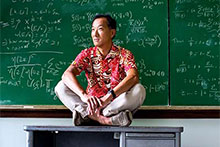
Math Professor Ken Ono
Surrounded by current and former students, Ken Ono is in perpetual motion—bouncing from conversation to conversation, firing off questions about progress on current work, debating problems, and offering up anecdotes related to the ideas being discussed.
Ono, Asa Griggs Candler Professor of Mathematics, is an internationally recognized number theorist who has earned renown for proving theorems that have long puzzled the greatest minds in mathematics.
Many of Ono’s students come from institutions around the country specifically to study with him, while others find him by fortuitous chance—all promising intellectuals whose academic paths have crossed with Ono’s.
Ono’s own path to academic achievement might have taken a very different turn if not for an almost preternatural connection to a gifted Indian mathematician who died almost a half century before Ono was born.
Srinivasa Ramanujan was a poor clerk in Madras, India, in 1914 when he began to write letters to the renowned mathematicians around the world, begging them to review his work. One of those letters caught the attention of British mathematician G. H. Hardy, who recognized the genius in the writer and arranged for Ramanujan to study with him at Cambridge University.
During the next few years, until his untimely death at age thirty-two in 1920, Ramanujan made highly original and unconventional contributions to mathematics that have inspired research to the present day, including much of Ono’s work.
“Following Ramanujan, whether I’ve meant to or not, has always been my destiny,” says Ono.
The son of a mathematician—Johns Hopkins University Professor Emeritus Takashi Ono—Ken Ono displayed remarkable mathematical aptitude from a tender age. As a child, Johns Hopkins psychologist Julian C. Stanley observed him for his study of exceptional talent.
“I was one of ‘those’ kids, but I didn’t want to be one of those kids. Who wants to be the only Asian kid in an all-white neighborhood who is good at math?” says Ono, the youngest of three sons whose parents escaped from post-World War II Japan because of his father’s mathematical talent. “My parents thought that the only way their kids could succeed was by becoming superstar scientists. That is what they trained us for. I kind of rebelled against that.”

